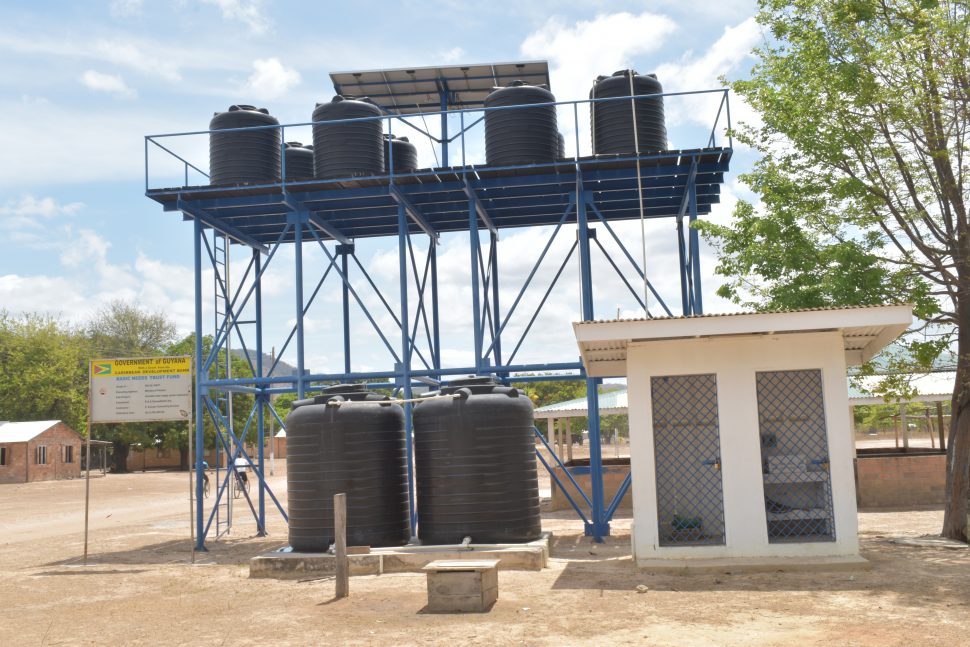A disagreement has erupted between GWI and the Caribbean Development Bank (CDB)-financed Basic Needs Trust Fund (BNTF) programme over the quality of water systems done by the latter in Region Nine.
Following the discovery of defects in Region Nine water systems constructed through the BNTF, the Guyana Water Incorporated (GWI) Executive Director of Hinterland Services, Ramchand Jailal, last week reiterated that there is a need for better collaboration between funding agencies and the water company.
In a press release, Jailal had said that the community of Karasabai relied on a water supply system that was constructed through the BNTF, which ultimately proved unreliable, since the system was flawed in design and could not satisfy the needs of the community.
He had also stated that they found similar issues among other villages in the region, and as a result, GWI was calling for all funding and execution agencies to ensure that they consult with the water company prior to the commencement of projects that seek to provide potable water services to citizens.
However, project manager of the BNTF, Dilkedemma Utoh, also explained to this newspaper lastTuesday that they have had a “very long working relationship” in terms of implementing development projects in and around Guyana with GWI. He pointed out that all the projects would have been approved by the water company before implementation. “We would not obtain ‘no objection’ from the CDB [Caribbean Development Bank] unless we also have approval from GWI,” he said, while noting that for the hinterland projects they “more or less” implemented the GWI model.
Jailal had explained to Stabroek News on Tuesday that in Karasabai, they found a system that was designed with a solar battery set up, which was housed in a building where there was a lot of heat. Such a design, he argued, is “really poor” since having a battery system in a building that is subjected to a large amount of heat would result in the system failing very easily.
“Designs have to be environmentally-friendly; friendly to the specific location. These systems we are placing in the interior regions, we need them to be operating at full efficiency with as little maintenance as possible. There are too many variables that could cause the system to fail or stop working and so it puts a lot of pressure on the community, and if one of the many variables fail, then the entire system fails,” Jailal explained.
He further pointed out, that the systems that they use rely on a solar apparatus to pump water to tanks, from which it is then fed to the system without the use of batteries.
“If there is a design to use the batteries, then the batteries have to be placed in a suitably designed room and has to be low maintenance so it doesn’t break down frequently and no need for too much reactive works,” he added.
Utoh, addressing the issue, said that BNTF recently held talks with GWI about systems not working but from their perspective, they were implementing the GWI model.
“Specifically at Karasabai, we did not construct a well. There was an existing well and we improved the water source capacity of the area. When we complete a project they are handed over to GWI and they would be in charge of maintenance. We are just the funding agency and at the time of the handing over they should’ve raised the issues,” he added, while noting that the Karasabai system has been handed over to GWI to become their responsibility for maintenance.
However, Jailal contested this, contending that the system is not the company’s model and would have been designed by consultants that were hired by the CDB.
“Right now GWI do many projects and we would do it in house but the BNTF are utilising consultants and many times even though GWI would’ve possibly granted concurrence to the design, sometimes there are not full consultations with GWI throughout the project and then when it is finished, GWI needs to take over,” he explained, while stating that they are demanding to have full consultations, not only with the BNTF but also all other agencies that are carrying out water projects in the interior.
Jailal further noted that since he took up his new position at the helm of Hinterland Services in January, they have found that many of the systems are not designed with the right size of panels. As a result, GWI has upgraded its capacity in order to determine where its systems should be modeled and what would be the most efficient design to adopt, without the use of consultants.
However, since projects funded by organisations such as the BNTF will always require the work of consultants, they will need to work closely with GWI to ensure that whatever is proposed is accepted.
“We had many meetings with them recently and so there will be closer collaboration because there is a crisis in the community because there is a prolonged dry period and GWI has to bite the bullet and try to find different solutions,” Jailal added.





